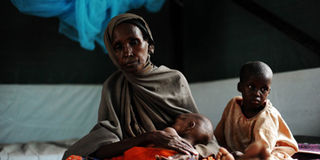Somali envoy defends refugees over terrorism claims

Sixty-year-old Suban Osman sits with two of her malnourished grand children at a clinic run by Doctors Without Borders (MSF) at the Dadaab refugee camp. Somalia has defended its refugees in the Kenyan camp of Dadaab against claims that they take part in terrorism. Photo/AFP
Somalia has defended its refugees in the Kenyan camp of Dadaab against claims that they take part in terrorism.
Somali ambassador in Nairobi Mohamed Ali Nur told journalists on Tuesday that the refugees at the world’s most populous camp are in fact victims and not participants in terrorism.
“These refugees who are in the camps are innocent people. I want to say that the refugees themselves have been victims. Some of them were killed, some women were raped, and kids were killed,” he said in Nairobi.
“Sometimes I really do not like when I see in the media, in the newspapers, saying that the refugees are themselves terrorists.”
Mr Nur was responding to the recent claims that some of the raiders at the Westgate Mall attack were trained at the Dadaab refugee camp.
ATTACK PLANNED IN DADAAB
The Westgate terrorist attack was planned at the Daadab refugee camp, investigations have revealed.
Security chiefs on Thursday submitted a report to the National Assembly indicating that the September 21 attack in which at least 70 people and 240 others were injured was planned in Dadaab.
“It’s confirmed (that) quite a number of these crooks planned this terror attack from a refugee camp. That’s why we have always said we need to consider relocating all refugees outside this country.
“Go back to Somalia or ask the United Nations to take them to another country. We don’t have a pact with Somalia on refugees,” said chairman of the National Security committee Asman Mr Kamama.
Although Parliament is still carrying out its investigation, Kenya recently urged the repatriation of Somali refugees and the eventual closure of the camp authorities suspect harbour some of the al-Shabaab sympathisers.
But Mr Nur said closing the camp now could be worse for the region than now.
“I want to underline here that we do not agree and we do not support forceful return of refugees. It has to be voluntary. We have also over one million IDPs inside Somalia and we don’t want to create more IDPs. We want to return them voluntarily in a dignified way.”
“I can understand the feeling of the Kenyan government and the people of Kenya the burden that these refugees have placed on them. But there are rules and laws that govern international refugees which say that refugees cannot be returned forcefully to where they came from.”
KENYA HOSTS 600,000 SOMALIS
Kenya has been hosting more than 600,000 Somalis who ran away from the conflict back home since 1993 but the envoy argued they would be here “temporarily.”
Although there have been reports that a draft tripartite agreement between Kenya, Somalia and the UN refugee agency, UNHCR, the three sides have nota announced when the agreement would finally be signed.
“It is very important for Somalis to return home. Somalis abroad are not just about refugees. I think we have over 4 million Somalis in diaspora who have come back now.
About 30,000 people have crossed from Kenya and Ethiopia to Somalia this year with some 2,100 movements recorded in September, the UN refugee agency has said.
Last week, UNHCR announced that at least 30,000 Somalis have gone back home from both Kenya and Ethiopia but added that the movement was only “seasonal or temporary” because the situation in Somalis does is not safe for permanent relocations.
After 15 attempts to bring a stable government in Somalia, Somalis in October held elections in Mogadishu in which they elected President Hassan Sheikh Mohamoud. His government though still faces the threat of al-Shabaab and is still supported by Amisom Forces.



